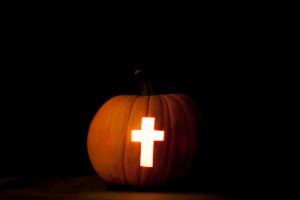Our daughter was invited to her first Halloween party when she was 8 months old, where she was, no doubt, the cutest ladybug ever.

Before we had a child, my husband and I were pretty unenthusiastic about Halloween. As Christians, we were leery of anything that celebrated or even resembled what we perceived as spiritual darkness. But another young mom from “Books and Babies” at our community library surprised us with an invitation to their Halloween party. It was a prime opportunity to get to know our new friends, and what harm could there be in a party for babies after all?
So we went, and the evening was filled with laughter, friendship, and over-the-top cuteness. For the first time, we experienced Halloween in a really positive and personal way.
Since our daughter’s Halloween debut, October 31 has become a “commercial juggernaut” – second only to Christmas in retail sales. “It’s a legitimate industry now,” says the president of the Haunted Attraction Association, “Now we’re a season.” As a Christian family, it’s difficult to be neutral about a “season” which can present itself in disturbing ways.
In these fourteen years of parenting, we’ve had increasing opportunities to participate in Halloween observances which are decreasingly innocent. The days of ladybug babies are over, and our daughter is invited to parties where the themes and activities are scary, gory, and everything that made us leery in the first place.
Several years ago, our daughter caught onto our conflicted feelings about Halloween. Local fall festivals and “trunk-or-treat” events were once popular options, but they seemingly vaporized like a ghost. Our church decided not to continue its October 31st event. This was during our daughter’s princess phase. All she knew of Halloween was the opportunity to receive free candy while becoming Belle or Cinderella (with plastic, sparkly heels!) for the night.
What’s a Christian parent to do?
I understand that most people take Halloween as silly fun. When summer is past, daylight is waning, and cold weather approaches, Halloween offers an opportunity for creativity (and candy). And community (and candy). But I digress…
More than creativity and chocolate, there are psychological and biological reasons why people are drawn to Halloween:
The haunted-attraction industry (haunted houses and theme parks) generate 300 – 500 million dollars in ticket sales. And morbidly supernatural themes, once limited to movie screens, are spilling over into television series. This sort of entertainment is successful because audiences are looking for the adrenaline rush that comes through being “scared to death.” The human brain craves the hormonal energy that’s produced when danger is simulated in an intentional, contained, and safe setting.
Also, Halloween costumes offer the opportunity for an imaginary, uninhibited, and temporary experience. According to Tom Harris, author of The Love of Halloween, “People in costumes often say and do things they probably wouldn’t say or do in their everyday life. It’s very satisfying to step into another character for a while, even (or especially) for a grown-up.”
Perhaps most importantly, Halloween is an occasion for cultures to make light of death, bringing the unknown realm into the open to be parodied with other people. Movies editor Steven Casey Murray says, “Horror movies cause us to ask the eternal question ‘what if,’ and allow us to safely delve into our primal fears.”
As parents with a Christian worldview, my husband and I believe that there are spiritual reasons for the life and death tension in our culture. I don’t believe that a demon is hiding under every rock, but I believe that God’s Word is true when it says that the enemy of our souls is real and active (Ephesians 6:12; 1 Peter 5:8). The ruler of the kingdom of darkness wants to keep people separated from God, in a grip of evil and fear.
Therefore, we want our daughter to learn how to think about the culture in which she lives in an examined way, with discernment. I set out to learn about the origins of Halloween, as a way to begin conversation. It seemed important to explore the question – is this a season, an observance, a celebration, something we ignore, or what?
Hundreds of years ago, a people group called the Celts lived on the British Isles. They believed that the souls of dead people visited earth on October 31. Fearful that evil spirits would destroy their crops, they built bonfires and wore scary costumes to frighten them away.
The Celts also carved frightful faces into turnips or gourds, put burning coal inside to turn them into lanterns, and set them outside their homes. And by leaving food (treats) on the outskirts of their towns, they hoped that evil spirits would not enter their villages (and perform tricks).
In the 8th century, the Catholic Church declared November 1 as a day to remember honorable Catholics who had passed away. It was commonly called “All Hallows’ Day,” and the night before (October 31) became known as Allhallowe’en.
Somewhere along the way, as a mix of European settlers came to America, their customs blended into what we now know as Halloween.
For our family, it was important to understand that the traditions of Halloween are rooted in fear and superstition. But it was also essential to communicate to our daughter that the day itself, October 31, is NOT an evil day. Like every other day, it is a day that the Lord has made.
Followers of Christ are a part of the Kingdom of Light (Colossians 1: 12 – 14). 1 John 4 says that GREATER is HE (Christ) who is in us than he (satan) who is in the world and that perfect love (the love of Christ) drives out fear (verses 4 & 18). Jesus is victorious every single day of the year!
So while our family gained some head knowledge – and spiritual reassurance – through our examination of Halloween, we still needed to figure out how to respond.
Around this season in our parenting, our pastor and church leaders started to challenge our church family to examine how we engage with our community. Our pastor encouraged us to investigate the question What are you for? It’s a relevant inquiry as Christians are increasingly known for what we’re against.
“What are you for?” speaks of the redemptive power of relationships, of not simply turning our backs on this world but by finding intentional ways to shine light in the darkness.
“We draw people to Christ not by loudly discrediting what they believe, by telling them how wrong they are and how right we are, but by showing them a light that is so lovely that they want with all their hearts to know the source of it.” ~ Madeline L’Engle
Around the same time that we were thinking of all these things, and as leaves turned yellow and red, I picked up Paul David Tripp’s book, Age of Opportunity: A Biblical Guide to Parenting Teens. We were still far from the teen years, but we had (still have) so much to learn.
In his chapter, Life in the Real World, Tripp illustrates 2 common Christian responses to culture: rejection and assimilation. I think my husband and I, in our early parenting philosophy, would have chosen rejection of the culture, when it comes to all things Halloween: no parties, trick-or-treating only at fall festivals (churches), nothing spooky, lights off at our house, etc, etc … But we caught a glimpse, eight months into parenting, that Halloween can be one of the most neighborly days of the year.
Yet, we’re not comfortable with throwing ourselves head-long into Halloween either. The Bible also tells us to think on things that are pure and honorable to God, and it’s our personal conviction that the creepy side of Halloween puts our thoughts elsewhere.
While we believe that families are free to decide for themselves, neither rejection or assimilation is entirely appealing to us. The Bible tells us that although we are not of this world, we are still in it (see Jesus’ words in John 17: 14 – 15).
Paul David Tripp suggests that if isolation from the culture (rejection) is on one end of the spectrum, and immersion in the culture (assimilation) is on the other end, then Christians can find a biblically-appropriate place between the two. He calls this place, “redemption interaction.”
Regardless of Halloween’s origins, we believe that our family can give a redemptive meaning to October 31. Instead of isolating from or immersing into culture, we want to interact with it. Matthew 5:14 – 16 tells us how:
“You are the light of the world. A town built on a hill cannot be hidden. Neither do people light a lamp and put it under a bowl. Instead they put it on its stand, and it gives light to everyone in the house. In the same way, let your light shine before others, that they may see your good deeds and glorify your Father in heaven.” Matthew 5: 14 – 16
Our family believes that God has purposefully placed us in this city, in this neighborhood, and on this street to care about our neighbors. How can we effectively do that if we don’t take opportunities to see them face to face? If we keep our lamp under a bowl? We began to understand the purpose behind our church’s decision to end the fall festival, thereby encouraging the congregation to return to our neighbors around our city instead.
In his book, Celebration of Discipline (1978), Richard Foster says, “Why allow Halloween to be a pagan holiday in commemoration of the powers of darkness? Fill the house or church with light; sing and celebrate the victory of Christ over darkness.”

While we wavered about Halloween, our neighbors did something which helped us to participate in a meaningful way. As trick-or-treaters filled the street, our neighbors brought huge stockpots of jambalaya outside, and a tradition began. Each year, the crowd grows, and Halloween has become THE gathering event of the year.

We’re grateful that someone took the initiative and we enjoy the benefits. And we’re inspired and challenged to forward the neighborly momentum down the street. I think this year, instead of waiting for little ones to come to our door, we’ll set up a table in the front yard with cider and cookies and greet the parents. On Halloween, acquaintances, even strangers, expectantly come to our house, and we can take advantage of the occasion to initiate and advance relationships. We’re excited about neighbors being part of one another’s lives beyond October 31.
As Tim Challies says, “One night does not a neighbor make (and one night does not a pagan make), but Halloween is the one night of the year where the good neighborliness that flows from being in Christ is communicated and reinforced. We are citizens of another Kingdom where The Light is always on.”
So, we’ll treat Halloween not as a holiday, but as an event. We’ll see this event as an opportunity to be for community. We’ll concentrate less on being against the darkness and focus more on being for the light. The light always wins!
As our family scoops out our pumpkin, we’ll talk about how great it is that Jesus has cleaned us up on the inside and put His light there. And we’ll put that light on display.

Join us, wherever God has placed you, and let it shine!



















